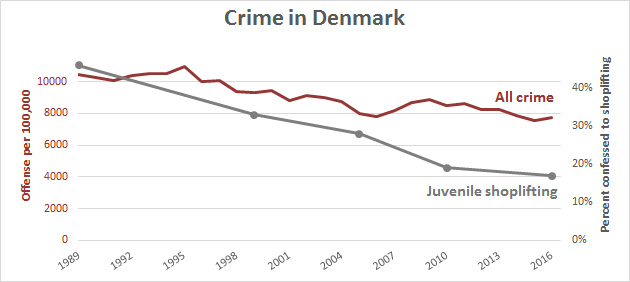Here’s a loyal reader who knows how to punch my buttons:
That sound you hear is @kdrum ‘s head explodinghttps://t.co/Zlo07OHHbT
— Shawn Sukumar (@shawnsukumar) February 22, 2017
Fine. What fresh hell do we have today?
“In Denmark, we are observing a trend toward a much more law-abiding youth,” said Rannva Moller Thomsen, an analyst with the Danish Crime Prevention Council. A recent long-term study funded by the council found that the share of 14-to-15-year olds who confessed to shoplifting at least one time dropped from 46 percent in 1989 to 17 percent in 2016.
….There are numerous possible explanations….But the most surprising explanation may be the simplest one: the Internet. “When young people spend time together in public spaces or meet privately and unwatched, the likelihood of them committing crimes increases,” said Moller Thomsen. “Many young people spend significantly more time online today than they did a few years ago. Overall, they are less social — but also less criminal.”
….In Britain, where youth crime levels have also sharply fallen, government and privately owned initiatives have been praised for creating organized activities that keep kids away from both the streets and from their computers and smartphones.
Right. In Denmark juvenile crime is declining because teens are all hunched over their smartphones instead of hanging around corner shops. In Britain, juvenile crime is down because of innovative programs that pull kids away from their smartphones. So let’s take a look at crime in Denmark. I will give myself a maximum of five minutes to research this. Starting…now.
I’m back. That took longer than I expected. I’m sure there’s better data out there, but here’s what I found after six minutes of googling. The numbers are from Table 8 in Nordic Criminal Statistics 1950–2010:1

I’ve overlaid the shoplifting statistics, and as you can see they pretty much follow the overall crime stats for Denmark. There’s a divergence between 2006-10, when overall crime increased, but the rest of the time both crime and juvenile shoplifting move pretty much in sync. I doubt very much that smartphones are responsible for the decline in murder and rape and fraud and so forth, so I doubt it’s responsible for the decline in juvenile shoplifting either.2
Besides, give me a break. Shoplifting declined by nearly half between 1989-2005, when smartphone penetration was about zero. This whole theory is ridiculous. I really wish everyone would knock it off with the outré just-so stories every time they run across some kind of crime statistic. Seriously, folks, what are the odds that smartphones have put the kibosh on shoplifting?
1Just because I love you all so much, I went ahead and filled in the 2011-16 crime figures from Danmarks Statistik.
2I think everybody knows what I do think is responsible, so I won’t mention it.















